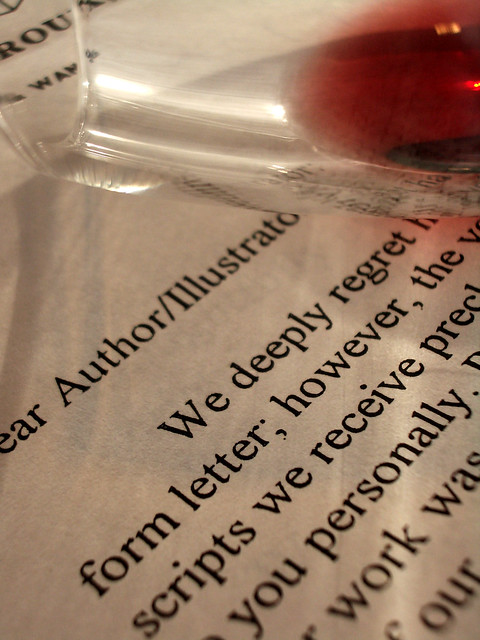 |
| Photo credit: BookMaMa on Flickr |
At the beginning of my journey I had this hope, you see. This flutter inside me that secretly wished I wouldn't have to, that whispered maybe not me. I clung on to that hope, and when my very first query letter brought back a request for a partial, I was ecstatic. I thought maybe I would be an exception, maybe, just maybe, I would be the writer that didn't have to deal with rejection.
I didn't send out any more query letters. I waited.
My first rejection arrived in the mailbox many weeks later. It was a heavy thing, literally, because it was attached to the first fifty pages I had printed out and sent to New York, now returned to me in a large yellow envelope. It was a nice rejection, personalized with a little feedback on why the agent had passed, but it didn't hurt any less. To my inexperienced eyes, a rejection was a rejection and the hopeful whisper died.
Since then, over the course of many years and manuscripts, I've collected more rejection letters than I care to count. But I'm not here to whine about rejection, in fact, I am, in a way, grateful for them. Because while they were difficult lessons to learn, dealing with rejection has taught me a few things:
- Not all rejections are created equal. There's a world of difference between a form rejection letter and a personalized one. Personalized rejections mean it was a near-miss, it means the agent (or editor) took the time to personally write you a rejection letter rather than doing the easy thing and sending a quick form rejection. True, they both mean "no," but the latter is a subtle way of saying you're almost there. Keep going.
- Rejections aren't the end. I know sometimes it doesn't feel like it, but life goes on after five, ten, fifty, a hundred rejections. Rejections don't mean that you're a terrible writer, or that you'll never be published, or any of those awful doubts that tend to creep in upon receiving bad news about your writing. Every writer has dealt with rejection of one form or another and the best thing you can do is keep going. Keep writing.
- For the writer, rejections are a part of life. Believe it or not, post-publication writers still receive rejections—they're called bad reviews, and even the legendary New York Times Bestselling authors receive them pretty regularly. As harsh as it sounds, the rejections that you receive while querying are teaching you an important lesson—they're teaching you how to develop a thick skin and continue working when the stones are being thrown. They're teaching you how to ignore the negativity and keep pushing forward.
These are lessons that are essential if you want to be a successful writer, and for that, I'm grateful. No, it's not easy, and truth be told, those rejections start to get heavy after a while, even when they're not attached to fifty pages of the manuscript that you poured your heart into.
But despite all that, I honestly believe that in the end, we'll all be better for the experience.
Have you dealt with rejection? What did you do to help you get through it?








4 comments:
Rejection in writing is a funny thing. I can be so critical about what I write that getting rejection letters makes me just kind of think, "Eh, that makes sense. This probably could use more working over."
While I was at university, I remember nearly all of my professors talking about rejection, but only one, the most published of all the professors at the university, ever told me about the rejections between publications. Before she ever had a single word published she got 76 rejections. After that it was another 60-something. Even after she had a collection of short-stories and two novels published, she would get about 40-50 rejections before finally being accepted.
As tough as it is to swallow, a determined write needs to press on. I think another important thing to remember is that writers need to be submitting constantly. I remember hearing (I can't recall from who) but that if you are wanting to be published and you are not receiving 3-5 rejections a week until it gets published, you're not submitting/querying enough.
Tough but encouraging.
I think it's great that you're able to look at rejection letters with enough detachment to even agree with them at times. Being able to handle criticism (both constructive and not) is a very important trait for writers.
I also think rejections between publications is an interesting topic. Out of curiosity, do you remember if your professor submitted directly to publishers (as opposed to getting an agent)?
In the end, you're right that writers need to keep going despite the rejections and disappointments. Thanks for sharing your thoughts, Austin!
As a beginning screenwriter, I'm learning all of these lessons first hand. Especially the personalized versus form letter. Since nobody really wants to read unsolicited screenplays these days I get a lot of form rejection letters. However every few days I'll receive a letter from someone who's at least read my logline. That can lead to others in the agency possibly taking a look (from what I hear).
Sometimes, yes, an agent will pass along a query to a colleague if they don't personally connect with it, but they think someone else at the agency might. Always great when that happens. :)
As for rejections, I think receiving form rejections is a sort of right of passage for the writer. We all receive them, and we all learn through experience just how different it feels to receive a personalized rejections, instead. It's not the easiest part of the writing life, but it's one that we all go through together.
I wish you all the best with your submissions!
Post a Comment